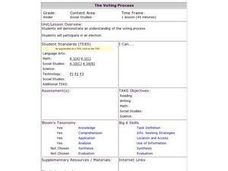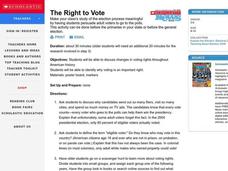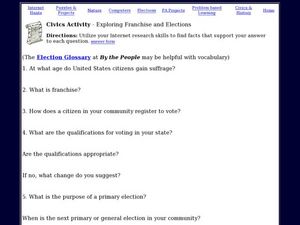Curated OER
The Presidential Campaign Game
Upper graders play a game as a way to facilitate understanding of US Presidential Campaign issues and strategies. After being divided into small groups, a candidate will be chosen to run for office. Each group creates propaganda to get...
Center for Civic Education
Lesson 3: Becoming a Voter
Who is eligible to vote in your state? Class members examine their states' voting qualifications, complete sample voter registration forms, and chart the elections scheduled.
Museum of the Moving Image
Evaluating Information: Focus on the 2008 Election
Just how true is the information contained in political ads? Determining the veracity of campaign ads from the 2008 presidential race is the focus of a lesson that introduces class members to several fact-checking resources.
Curated OER
The Voting Process
Students discuss the subject of voting. They are introduced to the question "How do we get what we want?" Explain to students that their parents vote in elections for our leaders, such as our president, for example. Discuss what a...
Curated OER
The Right to Vote
In this voting worksheet, students identify and discuss changes in voting rights throughout American history.
Then, they identify why voting is an important right for Americans. Finally, students create voting bookmarks instead of or in...
Curated OER
Preserving and Promoting Democracy
Eleventh graders create surveys to determine whether or not young people have or plan to vote. Using their findings, 11th graders make advertisements aimed at encouraging youth to vote.
Curated OER
Making Informed Decisions
Students discuss various issues of importance in the 1998 congressional and gubernatorial elections, create comparison charts of their states' candidates' positions on these issues, and decide which candidate they would vote for based on...
Curated OER
The Electoral College
Students examine the Electoral College's role in the election process. They conduct Internet research, and identify the elections in which the Electoral College played a deciding role.
Curated OER
Campaign 2000
Students research newspapers and the Internet to learn about the election. Students work in groups and choose a state that they want to compare to Florida. Students organize the data they have found into a graph labeling an "x" and "y"...
Curated OER
Primary Concerns
Students articulate their understanding of the primary process, critically evaluate the primary process on a systemic level and explore the significance of the Super Tuesday primaries on a Presidential election.
Curated OER
YOUR OWN CAMPAIGN
Twelfth graders, in groups propose a new law and design a campaign to get people to vote for their law. They have a voter's forum and hold a mock election.
Curated OER
What is Suffrage? Understanding the Right to Vote
Students discover one of the restrictions forced on women of the early 1900s. In this civil rights lesson, students investigate suffrage and why women were not allowed to vote in the early twentieth century. Students create a mock...
Curated OER
Nation Issues 2000
Eighth graders discuss an important issue and then vote on one of four candidates for President based on their views on the issue.
Curated OER
Select-a-Lawmaker
Students are assigned a party faction, examine bills voted on by their party faction last year, and find a candidate with a similiar view of government.
Curated OER
Bang to Rights
Students take a closer look at the rights of British prisoners. In this current events lesson, students research the listed Web sites that include information about the British justice system and voting practices. Students discuss...
Curated OER
It is Our Right-Don't Waste It!
Learners explore the basic rights granted to all American citizens by the U.S. Constitution in the light of women's issues. The women's suffrage movement, the role of Susan B. Anthony, and the timeline of events on voting rights are...
Curated OER
Our Country
Second graders study about being a citizen in a democracy. They also study about the important American symbols and the process for electing the President. Students develop a creative writing story and create a drawing of a room....
Curated OER
Covering the Campaign Trail: Technological Progress or Temporary Chaos?
Students study the changes in reporting and journalism techniques that have evolved due to advances in technology by reading an online transcript. They debate whether the technological advances are positive or negative in the reporting...
Curated OER
Exploring Franchise and Elections
Pupils examine the American election process. In this elections lesson, students use Internet sources to respond to 13 questions about election terminology.
Curated OER
Ohio Statehouse History
Fourth graders examine the history of the Ohio Statehouse and order the major historical events in its development. The instructional activity traces the development from the time of Ohio's vast wilderness to the house's completion in 1861.
Curated OER
Vote for Me!
Tenth graders analyze voter trends in South Carolina and discover techniques canddidates and their parties use to convince us to vote their way. They are able to locate voting statistics for their county; compare the number of...
Curated OER
The 1860 Election in Pennsylvania
Young scholars examine the political parties of the 1860 election and compare their platforms. In this election lesson young scholars determine the meaning of a political cartoon and predict the outcome of the 1860 election.
Curated OER
The election of 1824
Students explain why the election of 1824 was called the corrupt bargain and develop a better understanding of the Electoral College and see some of its flaws.
Curated OER
The Secret Ballot - Voting in Australia
Students participate in classroom activities to develop an understanding of the secret ballot and the process of voting in Australia. Working in large and small groups they use the secret ballot and the various stages in an in-class...

























